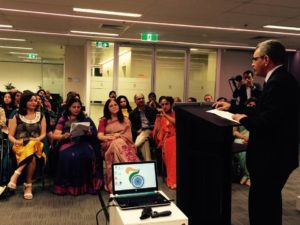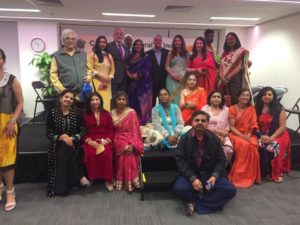Hindi Divas celebrates Hindi language in Sydney
Hindi Divas is celebrated worldwide on September 14 an initiative by the Indian government to promote and propagate Hindi language. September 14 is an important date in India’s history as in 1949 Hindi and its Devnagri script was officially adopted as the official language of India.
On September 16, Sydney celebrated Hindi Divas at the Consulate General of India along with ILASA (Indian Literary and Art Association of Australia) and Bhartiya Vidya Bhavan.
Many guests that included Hon. Jody McKay, Dr. Harinath, chair person Multicultural NSW, Hindu Council of Australia president Prof. Nihal Agar, community members, Hindi school principals, teachers and local Hindi writers graced the occasion. Hindi language was the flavour of the afternoon as Indian Consul Mr. S. K. Verma informed the present that the Consulate plans to provide a qualified Hindi teacher to resume Hindi classes at the premise. He also added that if any Hindi schools need any form of help in terms of teaching as well as resources the Consulate is too happy to provide.
 Rekha Rajvanshi, writer and co-ordinator ILASA, sang a special poem she wrote on the day ‘Aao Hindi ki sajaaye alpana’ and the session started on what kind of work is being done to promote Hindi in Sydney.
Rekha Rajvanshi, writer and co-ordinator ILASA, sang a special poem she wrote on the day ‘Aao Hindi ki sajaaye alpana’ and the session started on what kind of work is being done to promote Hindi in Sydney.
Gayatri Singh a Hindi academic and school principal from Kanpur, India was the keynote speaker and gave an insightful talk on Hindi. She talked about all the worthwhile work and research done quoting the works of many Hindi scholars from abroad that included countries such as Russia, Japan and Germany.
Teachers Archana Chaudhary, Kulwinder Kaur, Mritunjay Kumar spoke about their experiences of teaching Hindi. Mala Mehta talked about her IABBV Hindi School how the kids are taught Hindi to the level that around 50-60 children will be reciting poems either written by them or even of well known poets of India on school’s Hindi Divas Day. Akash Prasad gave an audio visual presentation of his Green Valley Hindi School where children are not only taught Hindi but culture as well as Indian music and musical instruments. He showed a demonstration of children playing tabla for the preparation of Diwali event at his school. Gunjan Tripathi said that emphasis at her school in Girraveen was on the normal day-to-day Hindi armed with which the children when in India can at least converse with their grand parents and family. Sudesh Verma, another teacher said that students keenly wait for her Hindi class on Sundays.
David Townsend, a Hindi student of Rekha Rajvanshi at Sydney university skillfully conducted the first session. Young Sanghmitra spoke about Hindi Films and her work there with Pallavi Sinha who said she learnt Hindi at home because in her school days Hindi schools were not available.
 The third segment had poets and writers of Sydney reciting their poems. Praise of Hindi language, its scientific basis, its rich expression was all evident from the sentiments in the poems. Bhavna Kunwar’s poem ‘Bhavnaon ko behne do’ was well received. Kunwar Manish Rana Rasik is another young man whose poem on the universal sentiment that is love was well received. Santram Bajaj’s humour piece in Hindi ‘Kaan ki Safai’ generated many laughs.
The third segment had poets and writers of Sydney reciting their poems. Praise of Hindi language, its scientific basis, its rich expression was all evident from the sentiments in the poems. Bhavna Kunwar’s poem ‘Bhavnaon ko behne do’ was well received. Kunwar Manish Rana Rasik is another young man whose poem on the universal sentiment that is love was well received. Santram Bajaj’s humour piece in Hindi ‘Kaan ki Safai’ generated many laughs.
Last year when Hindi conference was held at Sydney university the literature segment was towards the end and fell short of time. Same was the case today poets were exceptional but the time was tight. It would be a good idea that an exclusive session or an afternoon is devoted fully to literature. So that we can hear all those creative compositions of local writers.
Short URL: https://indiandownunder.com.au/?p=9713




